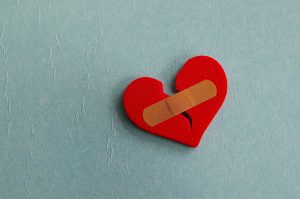Pain shopping: another brick in the wall
“Run towards the pain. Own it and run through it like a freak.”
That’s what she said when I asked her how she was feeling about the situation, how she was coping. “We’re all f*cking suffering. But I have no fear of the future.”
She was always a fierce one. I’ve known her a long time (nearly 30 years!) and she was, and is, a woman of commitment, of righteousness, of immense generosity, and the owner of a heart that encompasses not just her family, but her community and the broader world. A heart devoted to making the world a more beautiful place. A heart that believes in the voice of the people at the local politician’s town halls, that marches in city streets with supporters of just causes, that opens her home to every child in the neighborhood so they have a safe place to go – and get a cookie. A heart that recently shattered in a million sparkly sharp edges after discovering the affair.
She’s not alone. That’s something else she learned. I know this, too, because she is one of three women I’ve spoken to in the past few months who is experiencing betrayal in her marriage. And all three have talked about how this has led them to pain shopping.
For a lot of women, retail shopping is a pleasant, relaxing experience. You’re on a mission, you know what you like, you know what looks good on you and you’re determined to hunt down the exact, perfect item. It’s exploration and discovery. It can be exciting and fun. It’s a break from the day to day chores. It’s the potential of introducing something new into your home, your wardrobe, your environment; a way to add beauty, energy and even improve functionality. And you feel accomplished when you find the exact right dress or pair of shoes. You feel prettier… thinner… taller… just better.
But pain shopping has none of those benefits although some of the characteristics. It’s still exploration – and in the worst case scenario, it’s discovery – and it’s still a break from your usual daily routine. But it’s not hunting down the right blouse for that interview or the most flattering bathing suit of the season. You aren’t looking at the cut, style or color of an outfit to see how it makes you look fantastic, but rather you’re examining every detail to see how it shows your faults – where your stomach is too round, your breasts aren’t perky enough or your legs are too short. The shopping you do here only adds to the pain, to build more story, to inflict additional hurt on an already raw and devastating situation.
Pain shopping is what we do when we root doggedly through our husband’s wallet looking for receipts or hotel key cards, when we sneak through his iPad and laptop to find damning and sometimes blatantly sexual emails, when we check his cell phone while he’s in the shower for sultry text messages or go through files on his desk looking for letters or cards. Pain shopping is actively seeking out information that hurts you. Information that you already know. Information that confirms, “Yes, you’ve been hurt. Come here and let me hit you again.”
And yet you feel compelled to be hit by it, again and again.
And the reasons why are more complex than you might think. These women I know are not generally seekers of self-abuse. They are all accomplished, educated, lovely women who deftly juggle their home life, careers, volunteerism, and children. But you come to learn that none of that matters and pain is indeed the great equalizer.
 “I was in a murky pool,” she told me. She couldn’t see the bottom, she couldn’t see the sides of the pool and there was no sunshine glimmering at the top. How was she to escape? She couldn’t see clearly, she had no concept of the depth she was in. So she kept digging. She kept looking for the pain, for every shred of evidence until she could piece together a story that started to make sense to her. It might still be an ugly story. It might be a story that stomps on those tiny, slivered pieces of her heart. But once she had a story, any kind of story, she could regain some control. She could start to make sense of it, of the depth of the betrayal, of the possible meaning. And once she could get footing there, she could think about how to move forward.
“I was in a murky pool,” she told me. She couldn’t see the bottom, she couldn’t see the sides of the pool and there was no sunshine glimmering at the top. How was she to escape? She couldn’t see clearly, she had no concept of the depth she was in. So she kept digging. She kept looking for the pain, for every shred of evidence until she could piece together a story that started to make sense to her. It might still be an ugly story. It might be a story that stomps on those tiny, slivered pieces of her heart. But once she had a story, any kind of story, she could regain some control. She could start to make sense of it, of the depth of the betrayal, of the possible meaning. And once she could get footing there, she could think about how to move forward.
But first she needed to understand the scope of the betrayal.
And so did the others.
When you pain shop, you ping pong back and forth – shopping for the external clues and for the internal ones. You beat yourself up for not noticing the signs. You scrutinize every word, every moment, every nuance of yourself in an attempt to understand what it was about you that pushed your partner into another’s bed. You read and reread every note you find, you examine every photo you stumble across, you revisit every damn piece of evidence over and over again. You wonder how you could have been so stupid. You think everyone else must have known. You worry what else you’ve been oblivious to in your life that something this big happened. To you. You doggedly examine every inch of your physical body – did you give up on yourself after having the kids? Should you spend more time at the gym and color your hair? You replay constantly conversations in which maybe you should have been more flirtatious, injected more sexual innuendo. You count and recount scenarios in which maybe you should have given more… maybe you could have been nicer… maybe, maybe, maybe. And you angrily wonder if it’s all your fault. Haven’t you given enough? And so you curl into your shriveled self esteem and list all the the reasons you are not good enough, not pretty enough, not smart enough; why you are not lovable… so of course this happened to you.
And in that swirl of pain, you spiral round and round, and keep looking for more.
Because if you keep it fresh in front of you, it can’t blindside you again. This kind of hurt can’t happen again. You can’t survive that. Not again.
 So even after months of marriage counselling, of exercises in trust and transparency, in steady, difficult but dedicated efforts to rebuild a relationship, you find yourself rooting through his phone when he steps out of the room. You double check credit card statements for unexplained charges. You continue to ask questions about that other relationship, questions about why, what was different, and why again… you continue to pain shop. You whip out the pain credit card, upping your credit limit, and keep the pain fresh, right in front of you so that you may never again be betrayed.
So even after months of marriage counselling, of exercises in trust and transparency, in steady, difficult but dedicated efforts to rebuild a relationship, you find yourself rooting through his phone when he steps out of the room. You double check credit card statements for unexplained charges. You continue to ask questions about that other relationship, questions about why, what was different, and why again… you continue to pain shop. You whip out the pain credit card, upping your credit limit, and keep the pain fresh, right in front of you so that you may never again be betrayed.
And while this seems like the smart, practical thing to do, it’s also the most destructive.
Because at some point, there is no credit left on the pain credit card you have been shopping with. You look at all those pain purchases and you have to do something with them. You decide that you will not be taken advantage of again. You will not be fooled. There are no more discounts, sales or deals to be had here. You will not accept face value assertions. You will not let it slide. You will not be so naive as to take trust for granted. There are so many things you will not do again… so each pain purchase becomes a hard little brick of “never again” and it forms a wall around what’s left of your shredded heart.
And it feels like protection. It feels like safety. It’s your buyer’s warranty.
And it feels alone. Because it is.
Because behind that wall, you will never feel security – only the lack of it. You will never feel the warmth of affection – only cool comfort of reasonable distance. You will never feel the wildly free fires of passion – only the ice of anger. You sit alone behind that wall of pain-made bricks.
Whether you are trying to rebuild your current relationship or move on to a new one, that wall you’ve carefully stacked around your heart, with brick by brick of pain shopping facts, serves only to keep you trapped in a vicious jail of your own making. It keeps the painful facts front and center in your mind. It barricades your heart from the love and vulnerability of another. It prevents you from moving on. The wall does more than keep others out. It keeps you in.
 We can’t stop the pain shopping. And for a time, we can’t stop ourselves from building that wall. It’s necessary. It’s how we heal. But there comes a point where we must make a choice. Do we live within the fortress we have created, ensured that no love gets in – or out?
We can’t stop the pain shopping. And for a time, we can’t stop ourselves from building that wall. It’s necessary. It’s how we heal. But there comes a point where we must make a choice. Do we live within the fortress we have created, ensured that no love gets in – or out?
Or do we start the difficult process of taking the wall down, brick by brick, so that we love again – so that we love ourselves again?
Natalie Hahn is a principal at Dirty Girls Consulting, focused on helping men and women tackle the challenges of communication and life transitions. We redefine the “midlife crisis” to accomplish professional and personal goals, creating an authentic, fully loving life. Read more Dirty Girl Consulting blogs here.



